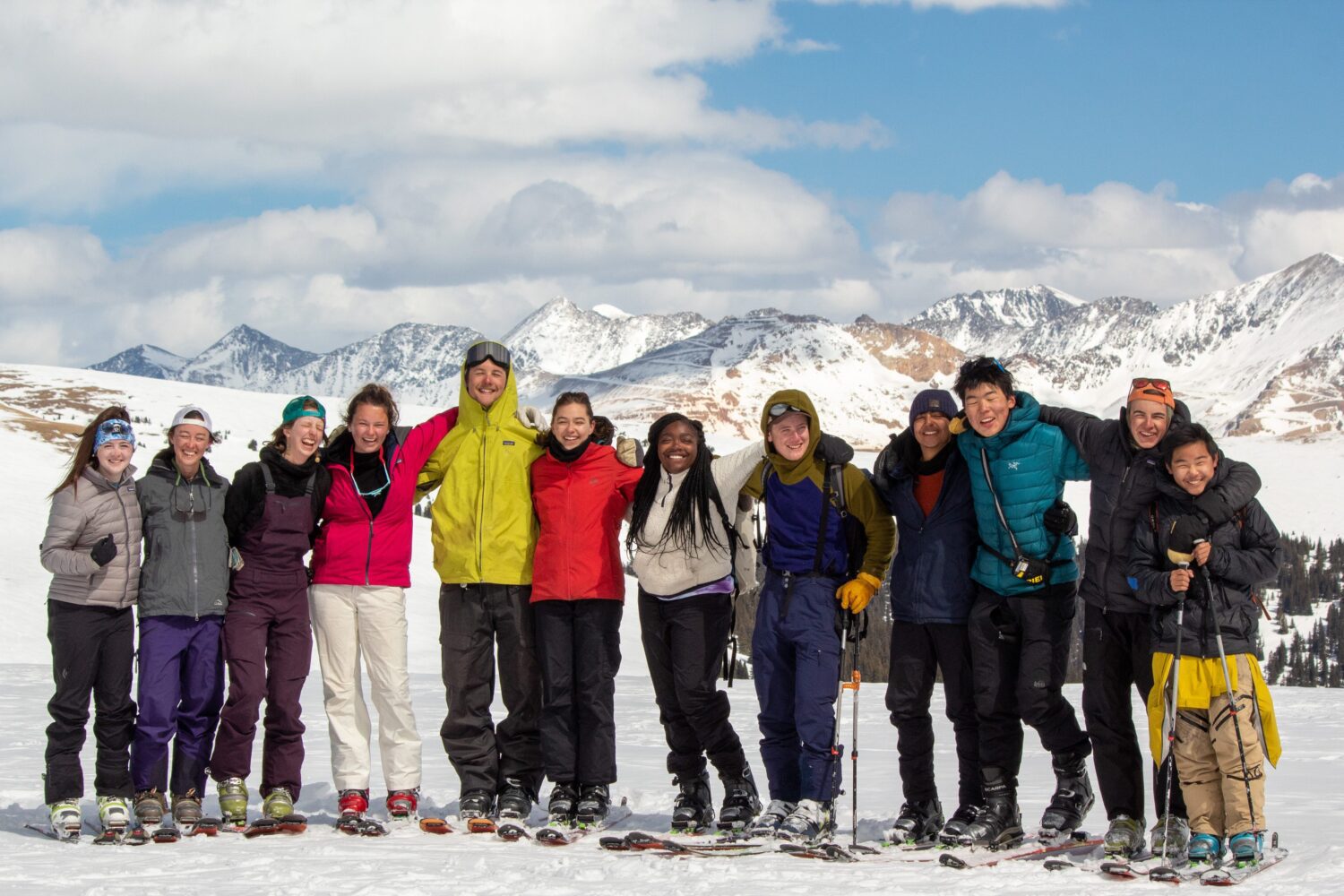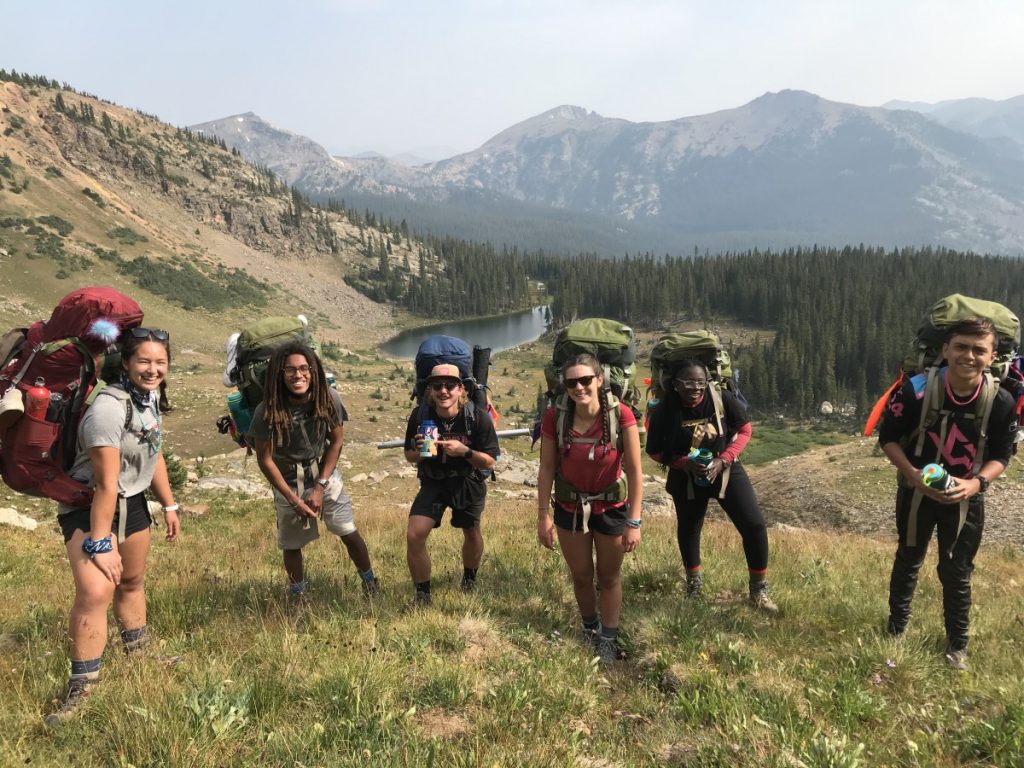HMI Diversity & Inclusion Statement
The High Mountain Institute believes that both diversity and inclusion are essential to growth and learning. We all achieve our potential when each person in the community feels a true sense of belonging, and has the confidence to express their full self.
At HMI, inclusiveness starts with an intentional and affirming community. Creating such a community is our priority. We connect deeply to each other through classes, wilderness expeditions, and shared responsibilities. We prioritize open communication and honest conflict resolution. These efforts inspire us to build trust, to value diverging perspectives, and to build communities greater than ourselves.
Historically, however, outdoor programs like HMI have attracted largely white and privileged populations. At times, this has made it challenging for all at our school to feel fully part of our community. We seek to address these challenges at HMI by increasing the diversity of our students, faculty, staff, trustees, and advisers; by creating classes and activities that explore and reflect students’ identities; by expanding the cultural competence of faculty and staff; and by continually challenging the assumptions we hold.
We engage with this challenging work because we are committed to building an exceptional learning environment rooted in community—not just for some, but for all who seek to be inspired by the natural world.

The Steps We Are Taking
We do not pretend that HMI—or the people who bring it to life—are immune to prejudices that permeate our world and prevent our school becoming the diverse equitable, and inclusive community that we want it to be. Naming this barrier is only the beginning. While equity work is difficult, our staff, faculty, and board of trustees are committed for the long term. We owe it to our alumni, our future students, and our entire HMI community to ensure all students feel valued, affirmed, and transformed by their time at HMI. This is the goal to which we dedicate ourselves.
Below we outline some of the action we are taking as a school to increase our diversity and push for institutional equity and inclusion:
To attract applicants of diverse socioeconomic backgrounds, we have dedicated HMI’s endowment draw exclusively to supporting need-based financial aid. This is in addition to the more than 20% of our budget that goes towards financial aid each year. All told, around 30% of our Semester and Summer Term students receive need-based financial aid.
Our financial aid packages go well beyond covering just the cost of tuition. Depending on the needs of families, financial aid awards can include the following:
- Free or reduced-price outdoor gear rental
- Roundtrip airfare to Colorado
- HMI-sponsored medical insurance
- Travel for family members to attend Family Weekend
Further, we have developed financial aid-specific marketing materials and an online Financial Aid Estimator tool to provide concise and helpful information about the financial aid we offer to prospective families.
In the coming years, our next major fundraising effort will be dedicated to funding our equity initiatives, including increasing the percentage of our budget we are able to commit to financial aid.
In an effort to expand the diversity of our applicant pool and student body, we are changing the way we recruit. In recent years, we have built and strengthened relationships with nearly two dozen public schools, charter schools, and educational-access nonprofits across the country. These organizations help us connect with students who otherwise would never have found our school. Additionally, we now offer admissions webinars targetted towards students of color and their families.
Finally, the HMI Admissions Office has never been more welcoming to Spanish-speaking families. Both Admissions Director Ray McGaughey and Admissions Officer Lupe Bobadilla are fluent in Spanish and families can now access a Spanish version of our website and participate in Spanish language admissions presentations.
Since 2019, a taskforce of HMI staff and faculty has worked to improve hiring practices and increase candidate diversity in our hiring pools. HMI partners with a number of minority recruiting agencies, including Strategenius and Nemnet in order to recruit more employees of color. We are posting open positions on a wider range of job sites, and auditing each position description before it is posted to ensure they are culturally welcoming to people of all backgrounds.
We are also focusing our efforts on ensuring that average tenure for employees of color is as long–if not longer–than that of our white employees. Among other initiatives, we have committed extra resources towards professional development and mentorship opportunities for employees of color.
Finally, we recently changed the model of our Apprentice Program from a tuition-based program to a paid one. By compensating apprentices we aim to break down barriers of access to outdoor education and diversify our adult population.
In fall 2021 Lupe Bobadilla began working as HMI’s first Director of Diversity, Equity & Inclusion. As a member of the administrative leadership team, Lupe reports directly to the head of school. Among other iniatives, Lupe has worked to implement all-staff inclusion trainings, audit wilderness and academic curicula for bias, and strengthen our faculty-led affinity spaces. Read an interview with Lupe here.
HMI is a founding member of the Colorado Diversity Network, a network of independent schools devoted to teacher professional development around equity and inclusion, and we have doubled our professional development budget to provide more opportunities for our teachers to engage in this work.
Each year we send employees to the NAIS Diversity Leadership Institute or the Diversity Directions Independent School Seminar. Since 2020 all HMI employees of color have been eligible and encouraged to attend NAIS’ People of Color Conference.
Even though attending these multi-day conference-style trainings is something that our team highly values, for many reasons, not all employees are able to take advantage of these types of trainings each year. Recognizing this, we have dedicated time and resources to bringing professional trainers on diversity, equity, and inclusion to our campus for mandatory all-staff training days.
In addition to these formal trainings and workshops, we coordinate our own internal trainings in order to better equip our team to handle difficult conversations around bias, inclusion, and equity.
We have added responsibilities concerning diversity, equity, and inclusion to every employee’s job description as well as our annual staff self-evaluation questions. Additionally, we have begun including this as an area of evaluation for all staff by their supervisors.
We are committed to doing the difficult work of identifying and unlearning the biases we each hold as individuals. Step by step, our team is creating a culture of shutting down exclusionary behavior when we see it in our community.
Each semester cohort participates in our “Identity Series”. This is an on-campus biweekly facilitated community meeting where all students are encouraged to share personal stories and explore how the various identities present in our semester shape our community.
Students also have access to two faculty-led affinity spaces on campus, the People of Color affinity group, and Q² (Queer & Questioning).
HMI has renovated facilities, reorganized student groupings on backpacking expeditions, and made preparations to welcome students all along the gender spectrum to our school. With the opening of our new Student and Faculty Center in summer 2022 we have greatly increased the number of gender-neutral bathrooms on our campus.
We are auditing all of our academic, leadership, and community curricula and making changes to better promote cultural inclusion. Below are just a few examples of what these changes look like:
- On expeditions, we learn about the history of the land on which we recreate. We discuss land acknowledgments to spark conversations about land ownership and management and to cultivate a stronger, more historically accurate sense of place in the wilderness.
- In math class, our teachers highlight mathematicians from underrepresented backgrounds each week and lead students in discussions about the ways we socially construct what it means to be “good at math” in order to broaden the ways students see themselves and others as mathematicians.
- In Practices & Principles: Ethics of the Natural World, we explore the intersectionality of identity and the outdoors throughout all of our topics yet perhaps most directly in units such as “Defining Wilderness” and “Access and Inclusivity in Outdoor Recreation.” Here are a few examples the texts that our students explore in this class:
- “The Trouble with Wilderness” by William Cronon paired with “1492” by Charles Mann and “Black Women in Wilderness” by Evelyn White
- “Shades of Darkness: Race and Environmental History” by Carolyn Merchant
- NPR’s Code Switch podcast: Being ‘Outdoorsy’ When You’re Black Or Brown
- It Matters Who You See in Outdoor Media by Carolyn Finney for Outside Magazine
- We’re Here. You Just Don’t See Us. by Latria Graham for Outsize Magazine
- Five Ways to Make the Outdoors More Inclusive by The Atlantic / REI
The following priorities are copied directly from our current Strategic Plan which was approved by the board in Fall 2019:
Strategic Goal #1: Advance our efforts in diversity, access, equity, and inclusion
Building a diverse and inclusive community is central to our mission. We cannot help our students grow into leaders, independent thinkers, and thoughtful citizens if our student body matriculates from like backgrounds, cultures, and ways of thought. HMI must also be a true home for all students—one where all students have access to the promise of our mission.
Therefore, we have outlined the following strategic priorities:
1) Define the approach to diversity, equity, and inclusion work that aligns with HMI’s mission and educational philosophy while helping meet the goals of our DEI statement. Increase economic diversity of the student body, first and foremost in the HMI Semester.
2) Ensure all students have excellent and comparable experiences, including those from traditionally underrepresented populations at HMI.
3) Diversify our employee, apprentice, and board populations, especially in terms of racial and ethnic diversity.
4) Construct new facilities with gender inclusive accommodations.

Recent Diversity & Inclusion News
- HMI Semester Affinity Spaces – July, 2023
- The Future of Diversity, Equity & Inclusion at HMI – Spring 2023 Newsletter
- HMI Alumna Jordan Sanchez on the DEI Subcommittee of the Alumni Council – Fall 2022 Newsletter
- DEI Update for Alumni – March, 2022
- Interview with HMI’s Director of Diversity, Equity & Inclusion, Lupe Bobadilla– October, 2021
- The HMI Apprenticeship is now a paid position! – September, 2021
- HMI Semester affinity groups’ mission statements published – September, 2021
- Update on HMI’s Diversity, Equity, & Inclusion Work – January, 2021
- Elevating Voices of Color – Fall 2020 Newsletter
- Director of Admissions Ray McGaughey on diversity and access at HMI – July, 2020
- Math faculty Dylan Kane on anti-racism in the classroom – June, 2020
- Dean of Students Jess Wolinsky on the anti-racism and inclusion initiatives implemented in her time at HMI – June, 2020
- Head of School Danny O’Brien on racial injustice in America as it relates to our school – June, 2020
- Admissions Associate Lupe Bobadilla on Identity at HMI and the NAIS People of Color Conference – Spring 2020 Newsletter
- Diversity, Equity, & Inclusion are priority #1 in HMI’s new five-year strategic plan – Spring 2020 Newsletter
- HMI faculty and staff on their experience at the week-long Diversity Directions seminar – Fall 2019 Newsletter
- Alumni participants on the inaugural Alumni of Color Retreat, part of HMI’s 20-Year Reunion – Fall 2018 Newsletter
- HMI faculty describe new Gender and Leadership class in our wilderness curriculum – Fall 2018 Newsletter
- Diversity at HMI: A Snapshot – May, 2018
- HMI announces new Diversity & Inclusion Statement – Spring 2018 Newsletter

